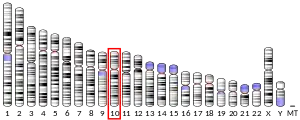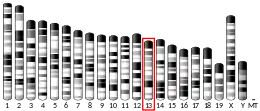AKR1C2
Aldo-keto reductase family 1 member C2, also known as bile acid binding protein, 3α-hydroxysteroid dehydrogenase type 3, and dihydrodiol dehydrogenase type 2, is an enzyme that in humans is encoded by the AKR1C2 gene.[5]
This gene encodes a member of the aldo/keto reductase superfamily, which consists of more than 40 known enzymes and proteins. These enzymes catalyze the conversion of aldehydes and ketones to their corresponding alcohols using NADH and/or NADPH as cofactors. The enzymes display overlapping but distinct substrate specificity. This enzyme binds bile acid with high affinity, and shows minimal 3α-hydroxysteroid dehydrogenase activity. This gene shares high sequence identity with three other gene members and is clustered with those three genes at chromosome 10p15-p14. Three transcript variants encoding two different isoforms have been found for this gene.[5]
References
- GRCh38: Ensembl release 89: ENSG00000151632 - Ensembl, May 2017
- GRCm38: Ensembl release 89: ENSMUSG00000021207 - Ensembl, May 2017
- "Human PubMed Reference:". National Center for Biotechnology Information, U.S. National Library of Medicine.
- "Mouse PubMed Reference:". National Center for Biotechnology Information, U.S. National Library of Medicine.
- "Entrez Gene: AKR1C2 aldo-keto reductase family 1, member C2 (dihydrodiol dehydrogenase 1; 20-alpha (3-alpha)-hydroxysteroid dehydrogenase)". National Center for Biotechnology Information, U.S. National Library of Medicine.
 This article incorporates text from this source, which is in the public domain.
This article incorporates text from this source, which is in the public domain.
External links
- Human AKR1C2 genome location and AKR1C2 gene details page in the UCSC Genome Browser.



